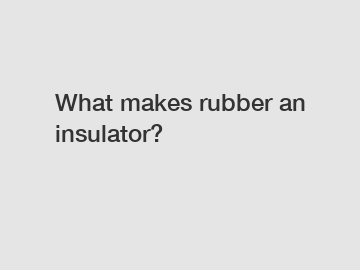What makes rubber an insulator?
Rubber, known for its flexibility and elasticity, is also widely used as an insulator in various applications. But what exactly makes rubber an insulator? In this article, we will delve into the properties of rubber that make it an effective insulating material.
### Insulation Properties of Rubber.
Rubber is a good insulator primarily due to its high resistance to the flow of electricity. This property is known as resistivity, which is the measure of a material's ability to impede the flow of electrical current. Rubber has a very high resistivity, making it an excellent choice for insulating materials in electrical applications.

### Electrons and Conductivity.
In order to understand why rubber is a good insulator, it's important to first understand how electrical conductivity works in materials. Electrical conductivity is the ability of a material to conduct electricity, and it is determined by the movement of electrons within the material. In conductive materials, such as metals, electrons are able to move freely, allowing for the flow of electrical current. In insulating materials, on the other hand, electrons are tightly bound to the atoms in the material, preventing the flow of electrical current.
### Bonding Structure of Rubber.
Rubber is composed of long polymer chains that are held together by strong covalent bonds. These bonds keep the electrons within the rubber molecules tightly bound, making it difficult for them to move freely. As a result, rubber has a high resistivity, meaning it does not allow the flow of electrical current easily. This property makes rubber an effective insulating material, as it can help prevent electrical shocks and short circuits.
### Flexibility and Durability.
In addition to its insulating properties, rubber is also valued for its flexibility and durability. These characteristics make rubber a versatile material for a wide range of applications, from electrical insulation to shock absorption. Rubber can be molded into different shapes and forms, making it suitable for various types of insulating products, such as electrical wires, cables, and insulation sheets.
### Water Resistance.
Another important property of rubber that contributes to its effectiveness as an insulator is its resistance to water. Water is a good conductor of electricity, so materials that are prone to moisture absorption may lose their insulating properties. Rubber, however, is inherently water-resistant, making it an ideal choice for applications where exposure to moisture is a concern. This water resistance helps maintain the integrity of the insulation and prevents electrical malfunctions.
### Conclusion.
In conclusion, rubber is a highly effective insulating material due to its high resistivity, bonding structure, flexibility, durability, and water resistance. These properties make rubber a versatile choice for a wide range of electrical insulation applications, providing safety and reliability in various industries. Whether it's protecting electrical wires from short circuits or insulating electronic devices from shocks, rubber continues to be a trusted insulating material.
If you have any further questions about the insulating properties of rubber or need assistance with selecting the right insulation materials for your project, please do not hesitate to contact us.
If you want to learn more, please visit our website transmission line fitting factories, powerline fuse, electrical wedge clamp.

Comments
0